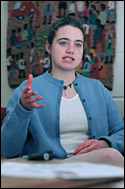Engineering a better world
Usually, when one hears the word "engineer," the things that leap into mind are speedy cars, sturdy skyscrapers and high-tech tools.
 McGill Engineers Without Borders President Alexandra Conliffe
McGill Engineers Without Borders President Alexandra ConliffePHOTO: Owen Egan |
|
If the student group Engineers Without Borders/Ingénieurs Sans Frontières (EWB/ISF) has its way, "engineering" will also become synonymous with international development. The Canadian organization aims to apply the knowledge and energy of engineering students to help bridge the technology gap between developed and developing countries.
Founded two years ago by a couple of University of Waterloo graduates, EWB rapidly spread to engineering faculties across the country, and now has 17 chapters in Canada. It is expanding into the U.S.
The McGill chapter, founded one year ago, played host last week to 170 delegates at the first EWB annual conference.
"We wanted to find out what the issues are, and how other people are dealing with them. We wanted to bring in some experts, and talk about some of the technological problems out there. Basically, we're getting ourselves informed and making contacts," says McGill chapter president Alexandra Conliffe (U2 Mech Eng) of the conference.
One speaker who created a bit of a stir among the delegates was Bunker Roy, director of the Barefoot College in the province of Rajasthan, India.
Although Roy attended the best schools in India (one of his classmates became prime minister) and could have gone on to great financial success, a visit to an impoverished village in northern India changed the course of his life.
"I was shocked to see such poverty, such hunger in my own country," he said. He resolved to devote his life to helping the poor, and eventually founded Barefoot College. As an institution of learning, it could accurately be characterized as unconventional.
"The thing that these people lacked -- and this was a tyranny for them -- was a paper qualification. So, the first thing we did was to disqualify anyone with a paper degree," he explained.
Operating on what Roy characterizes as Gandhian principles, the college aims to give rural dwellers skills that will allow them to remain in their home villages, rather than moving to the slums of the large cities.
Roy showed a short film about one of his school's pupils -- a woman named Kamla, who has a grade five education, yet now is a "solar engineer" -- responsible for the maintenance of all solar electricity units in 30 villages. In fact, Kamla also teaches others her skills at the college, and recently spoke to an international conference of engineers on bringing electric light to rural areas.
Operating in eight states in India, the college has faith in the potential of the sorts of people who wouldn't have a hope of being accepted into the programs offered by conventional universities. Villagers barely able to read learn how to operate computers and construct tanks for harvesting rainwater.
Not shy about his disdain for formal education -- despite addressing about 200 undergraduates on a university campus -- Roy asserted that the solutions to many of the problems facing developing countries aren't going to come from a classroom.
"My biggest challenge is my own [educated] people -- these are people who've never missed a meal in their life, never gone to the loo behind a bush... they have no idea what's going on in the rural areas."
Conliffe realizes that engineers from the developed world are not always equipped to deal with developing world issues. In addition to sponsoring internships in places such as Zambia and Mali, EWB also works with organizations that have a proven track record on development issues.
"We wanted a mix of backgrounds so we wouldn't go in with a project and only be thinking of the technology, but also how the technology impacts on the society, the politics, the culture, all of those things," she says.
The EWB advisory board has members from a wide variety of backgrounds -- the private sector, NGOs, government, even author and philosopher John Ralston Saul.
The EWB mission statement stresses that solutions to developing world problems must use "appropriate technology" -- that is, designed for the local environment, and able to be maintained with locally attainable training and materials.
EWB advisory board member Claire Dansereau, who is also the executive director of CUSO, knows all about the pitfalls of technology in developing societies. Dansereau spoke to the EWB delegates about the principle of community involvement and local participation in development projects.
"If you don't get it, you're doomed to fail," she warned.
"Technology transfer doesn't require a knowledge of just technology, it requires a knowledge of people."

